How to become a Phlebotomist in the UK 2024 [Beginner’s Guide]
Are you interested in pursuing a career in phlebotomy (process of drawing blood )? As a phlebotomist, your job involves collecting blood samples from patients for medical testing. Also called venipuncture (or venipuncture), it’s an essential healthcare skill benefiting others.
This article will cover the basics of phlebotomy careers for newcomers – typical work settings, training needs, pay rates, certification options, and tips to transition into this vital behind-the-scenes NHS role or private healthcare field.
Summary: how to become a Phlebotomist
- Consider if it is the right career path for you – think 10-15 years from now.
- Evaluate your current skills and abilities: good communication, attention to detail, and compassion.
- Obtain a level 2 qualification ( though no qualification is required). It shows big commitment.
- Consider Industry preference – community work, hospital, blood bank etc.
- Prepare your CV and practice interview questions. You can use ChatGPT for CV design and interview practice. See our sample prompt and CV.
- Apply for entry level phlebotomist jobs.
- Gain experience and keep on learning as things evolve.
JOIN NEXT CLASS
We will cover everything from the basic aspects of drawing blood (venepuncture) to advanced techniques. This training can be combined with Cannulation training for a well-rounded skillset.
FILL OUT OUR ENQUIRY FORM.
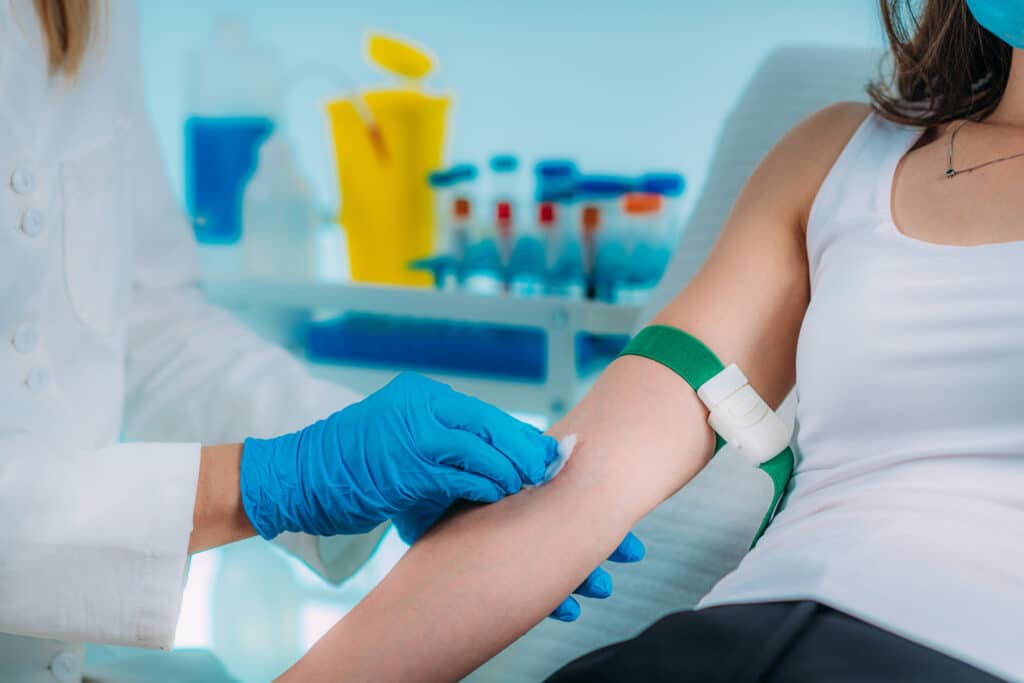
What is Phlebotomy and who is a Phlebotomist?
Phlebotomy refers to the practice of drawing blood from the vein, usually in the arm, from patients for clinical testing, transfusion, or blood donation purposes.
Specially trained phlebotomists use tools and methods to collect high-quality blood samples for further analysis.
A phlebotomist is a healthcare professional who is specially trained to collect blood samples from patients through venipuncture (puncturing a vein, usually on the arm).
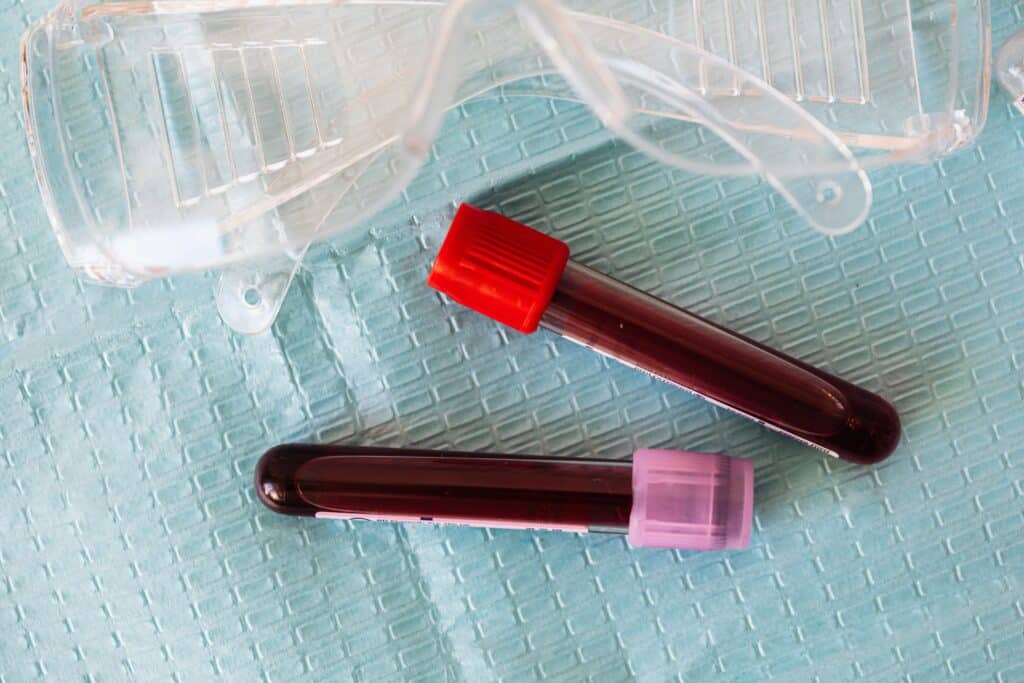
Formal phlebotomy training programs teach anatomy, bloodborne pathogens safety, procedures, ethics, legal issues, communication skills and medical terminology.
Getting a certification shows a strong commitment in building a career while staying compliant and competent in the field.
What does a Phlebotomist do?
As a phlebotomist, your core duty involves reliably obtaining blood specimens from patients for analysis and diagnostic purposes. This includes:
- Preparing vials, needles, and paperwork for assigned collection requests.
- Identifying patients and explaining the sampling procedure.
- Selecting appropriate vein sites based on anatomy and medical factors.
- Disinfecting draw sites on patients’ arms with antiseptic wipes.
- Skillfully inserting sterile needles into veins to draw sufficient blood samples required.
- Applying gauze to sample sites afterward to prevent bruising.
- Labelling specimens accurately and recording necessary details.
- Ensuring prompt delivery of blood samples to testing laboratories.
You’ll follow prescribed standard precautions for infection control and biohazard waste disposal protocols.
A strong focus on patient experience, communication skills, and attention to detail is vital as well when performing this technical role.
Why is Phlebotomy so Important in Healthcare?
Each day phlebotomists enable 100s of lifesaving blood tests by reliably collecting samples from patients that laboratory scientists analyse.
Without these quality samples, diagnoses get delayed leading to critical treatment decisions made on assumptions not facts. Poor samples mean unusable results.
So, you play a vital frontline role sustaining medical care through this underappreciated niche.
Phlebotomy is really important in healthcare because of the follow reasons:
- Getting Information: Taking a small amount of blood helps doctors understand what’s happening in your body. This helps them figure out if there’s anything wrong or if you need specific treatments.
- Keeping an Eye on Illnesses: Regular blood tests help check conditions like diabetes, cholesterol, and blood problems. This helps doctors manage these conditions better.
- Finding Problems Early: Phlebotomy can help find certain illnesses, like some types of cancer, early on. Finding problems early means treatments can be more successful.
- Planning Treatments: The information from blood tests helps doctors choose the right medicines and treatments for you based on your health.
- Helping Research: Blood samples are used in studies to find new treatments, understand genes, and learn more about medical things.
- Staying Healthy: Blood tests can show if you’re at risk for certain illnesses. This helps doctors give advice on how to stay healthy and lower your chances of getting sick.
- Giving and Getting Blood: Phlebotomy is important for blood donation. This helps keep a supply for transfusions, which are needed in emergencies or for people with blood issues.
- Checking How You’re Doing: In the hospital or during treatment, phlebotomy helps check how your body is responding to medicines. This helps doctors make good decisions about your care.
Where do Phlebotomists work?
Most phlebotomists within the NHS work in outpatient clinics and hospitals.
Those in clinics mainly draw samples with fewer patient cases. Hospital phlebotomists serve higher volumes of patients across wards and clinics – assisting with emergency and paediatric collections as needed.
Outside the NHS, phlebotomists work in:
- Private hospitals and clinics
- General practitioner offices
- Commercial medical labs
- Blood donation centres
- Private phlebotomy services covering care homes/community visits.
Some phlebotomists also cover multiple sites as mobile freelance health workers.
In addition to the above, some considerations to make before deciding on a career to become a phlebotomist include:
Know where you want to start your career and have a strong motivation, especially if it is a new territory for you. Just as there is strong motivation to travel to a city you have never been to but heard of, your motivation must be robust, considering there are other career options.
Draw up a list of likely motivations/challenges for different work settings and review.
Challenges could be:
- Traffic: How far or close to the workplace do you want to be?
- Transferable skills within a work setting: Are there skills you can bring on board as a beginner, such as excellent communication skills, the ability to offer exceptional care, and the ability to work as a team?
- Preference: Would you prefer to work for a community, hospital, prison department, or mental health home? You need to decide where your skills and long-term career perspective align.
- Work Hours: Understanding the flexibility available for each work environment can be a deciding factor between working within a community as a phlebotomist or working for a hospital.
What are common Phlebotomist duties?
- Check collection requests and test order forms on daily patient lists.
- Inventory specimen kits and order adequate stock for assignment.
- Prepare and label multiple vacant sample vials for streamlined draws.
- Verify patient identity against wristbands and signs to prevent errors.
- Recognise unsuitable veins and advise patients accordingly.
- Use gravity infusions on patients prone to fainting during blood draws.
- Offer post-procedure plasters and share test result timelines.
- Handle samples properly to avoid haemolysis or contamination issues.
- Complete detailed records on samples and submit forms.
- Book follow-up appointments if repeat testing needed.
- Clean equipment thoroughly ready for the next collection.
What skills make a good Phlebotomist?
- Concentration and precision coordinating technical vascular access.
- Manual dexterity guiding equipment smoothly.
- Visual acuity distinguishing vein qualities.
- Physical stamina for long periods standing.
- Time efficiency balancing patient volumes.
- Communication skills explaining procedures, calming nervous patients, etc.
- Organisational ability handling hectic workflows.
- Attention to detail labelling countless specimens.
- Commitment to infection prevention and control.
- Coping resilience when missed veins or mishaps occur.
How much do Phlebotomists earn?
According to gov.uk website, phlebotomists’ salary for starters would be £22,000 and goes as high as £28,000 with much experience.
Also, the UK talent salary review of 3627 Phlebotomist showed a median salary of £23,170/ Annual.
NHS phlebotomist roles fall under Agenda for Change Pay Band 2, with the 2023/24 starting at 22,383 and takes 2 years until pay progression.
NHS Specialist phlebotomists qualify as Band 3 at £22,816/yearly.
Outside the NHS in places like private labs or clinics, average phlebotomist salaries range £21,450-£30,700.
Senior phlebotomy roles and mobile team leads earn up to £31,000.
Part-time opportunities suit many drawn to flexible community care roles.
Most jobs prove reliable steady work based on essential healthcare demand.
For Individuals and Groups
Our phlebotomy training covers everything from basic blood draws to advanced techniques. Combine it with Cannulation training for a complete package.
FILL OUT OUR ENQUIRY FORM.

What Qualifications Do You Need?
No mandatory qualifications exist, but employers prefer certified training as proof of core competencies. Options include:
- Level 2 certificate courses in blood collection skills with work placement – offered by technical colleges and NHS provider arms. This intermediate route suits school leavers gaining broad patient care exposure alongside targeted phlebotomy skills.
- Level 3 diploma courses for aspiring higher level practitioners also adding managerial capabilities. Some offer work placements for direct NHS access.
- On-the-job NHS phlebotomy apprenticeships blending vocational modules with practical learning. These competitive programs partner trainees with educator mentors at trusts hungry for motivated talent.
Some employers hire prospectively keen staff without qualifications initially but mandate attaining certified courses once working.
These often include or reimburse access to required education. Hungry candidates prove themselves on willingness to skill up.
Certification requires proving competent sample collection on real patients through observed workplace assessments. Renewing with continuing education demonstrates ongoing proficiency.
Getting Started as a Phlebotomist
Excellent needle skills constitute only basic qualifications – most important is a caring attitude and ability to reassure patients positive impacts outweigh momentary discomfort.
If helping people hands-on appeals, proactive steps might include:
- Trying a free online taster course demoing the need for precision and a calm manner.
- Volunteering for customer-facing roles: good bedside manner proves vital.
- Researching health training companies offering phlebotomy training.
- Building basic care experience through roles like healthcare assistant.
- Familiarising with medical terminology, clinical workflows, and protocols.
- Targeting entry-level openings to aim for sponsorship.
- Being upfront on training goals from the start.
Once ready to pursue qualifications:
- Enrol in university modules, adult education diplomas or apprenticeship schemes
- Confirm required observation hours and ward access enable skill competency
- Treat placements as extended working interviews to stand out eager for mentorship
Then after gaining that first break, focus on cementing knowledge each day through peer practice, self-study, and protocol refreshers to become an indispensable vein finder with expertise to grow over a long career serving better care.
In an often unseen role, Phlebotomists play a crucial role in frontline interactions, ensuring that diagnostics and data supporting clinical decisions are completely accurate.
Constantly learning how to find and draw blood from veins prepares people with patience and steady hands for this important role in maintaining healthcare systems.
What’s the Benefit of a Phlebotomy Certificate?
While no qualifications are legally mandatory, a phlebotomy certificate shows you’ve demonstrated core blood collection skills and standards safely. Courses teach you:
- Selecting veins, needles and vials
- Disinfection and bleeding protocols
- Special handling of samples
- Labeling, transport and paperwork
- Single/multistep testing processes
- Quality compliance and ethics
- Customer care and communication
Formal training helps you gain accurate techniques, boost employability and qualify for more roles.
In addition, having a phlebotomy certificate proves that you have shown a bigger motivation to become a phlebotomist. It means you have gone beyond just mere desires into making meaningful decisions.
PHLEBOTOMY COURSE – LEVEL 2 – PRACTICAL TRAINING INCLUDED – SEE FULL COURSE CONTENT
What’s the Difference Between Venepuncture and Phlebotomy?
Venepuncture is another word for Phlebotomy -drawing blood from a vein. It’s done to get blood for tests or donations.
There’s no practical difference. Both terms refer to piercing a vein usually on the arm to draw blood samples.
They get used interchangeably to mean the same process undertaken by a phlebotomist.
Some other names venepuncture is also referred to as include:
- Blood draw
- Vein puncture
- Venous blood sampling
- IV access procedure
It is possible to come across the word Venipuncture instead of Venepuncture. The two spellings are variants of each other.
The word “venipuncture” is derived from the Latin words “vena” meaning “vein” and “pungere” meaning “to puncture.” The “e” in “venepuncture” is an epenthetic vowel, which is a vowel that is inserted between two consonants to make the pronunciation easier.
You can review our Venepuncture Course Content here to understand the similarity between both.
What Skills Should You Have?
The summary of the soft and hard phlebotomy skills needed for the role are:
- Technical skills like safe insertion of needles into tiny veins
- People skills for reassuring anxious patients.
- Being extra careful and detailed in handling samples.
- Organisational skills managing paperwork and test orders.
- Dexterity and stamina for extensive arm/hand motions.
- Time efficiency and multi-tasking.
- Coping resilience when collections miss veins.
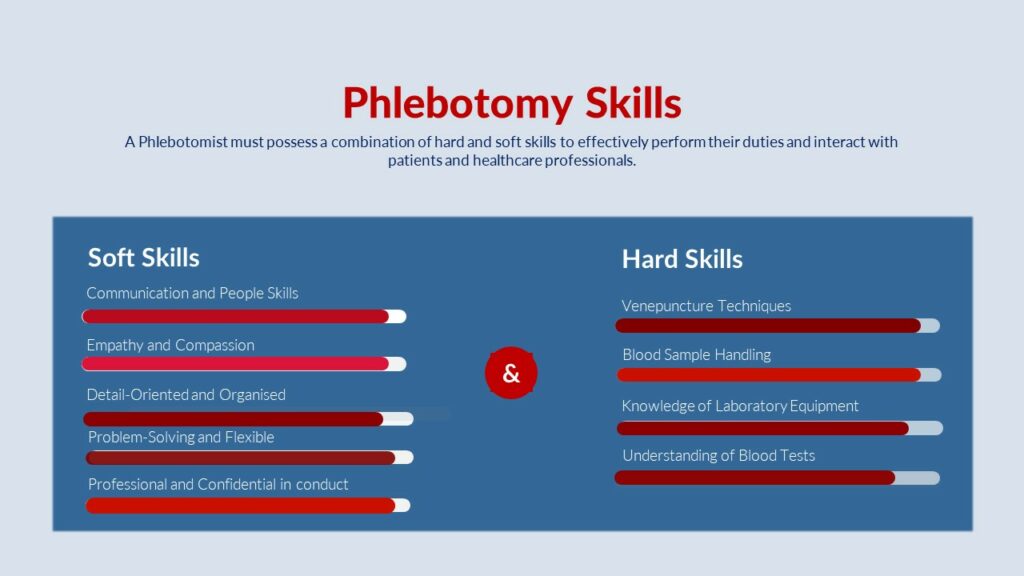
Soft Skills a Phlebotomist must have:
- Communication and People Skills:
- Effectively communicate with patients, explaining methods you will take and addressing concerns.
- Relate positively with healthcare professionals for a friendly work environment.
- Empathy and Compassion:
- Show understanding and kindness, especially with fearful patients, ensuring a comforting experience.
- Detail-Oriented and Organised:
- Pay close attention to details, ensuring accurate patient identification and sample labelling.
- Keep things organised to follow infection control protocols.
- Problem-Solving and Adaptability:
- Handle challenging situations like difficult vein access or patient anxiety.
- Adapt approaches to ensure successful blood draws.
- Professionalism and Confidentiality:
- Maintain professionalism in all interactions.
- Uphold confidentiality standards to protect patient privacy and follow ethical conduct.
Hard Skills for a Phlebotomist are:
- Venepuncture Techniques:
- Be skilled in identifying suitable veins, inserting needles, collecting blood samples, and applying pressure to the puncture site.
- Blood Sample Handling:
- Handle blood samples properly to maintain integrity and prevent contamination.
- Follow correct procedures for labeling, storage, and transportation of blood specimens.
- Laboratory Equipment and Procedures:
- Understand laboratory equipment and procedures to collaborate effectively with lab personnel.
- Ensure proper handling of blood samples during the entire process.
- Understanding of Blood Tests:
- Have a basic understanding of different blood tests and factors affecting their results.
- Use this knowledge to answer patient questions and provide appropriate care.
How does Phlebotomy Link with Bioinformatics?
Bioinformatics refers to specialised computing systems managing biological data. Phlebotomy and bioinformatics work together in medical research.
Phlebotomists collect blood samples, which are important for bioinformatics to study.
Bioinformatics helps understand diseases and personalise healthcare by looking at the data from these samples.
This emerging field relies on quality human blood, tissue and other biodata that phlebotomists supply to populate the databases and help identify diagnostic clues through big data analytics and precision medicine approaches.
What is Career Growth Like in Phlebotomy?
With growing health testing and monitoring needs, phlebotomists see expanding positions across all medical settings from clinics to hospitals to labs to mobile health.
Most enjoy steady full-time work. Phlebotomy offers a promising career path with a projected 9% growth from 2020 to 2030.
Phlebotomists in the UK can look forward to a positive job outlook. According to the National Health Service (NHS), an additional 2,400 phlebotomists will be required by 2028.
This demand is driven by the aging population and the growing need for healthcare services.
You can progress into lead phlebotomist, lab assistant, clinical trials, biobanks or cross-train nursing. It offers diverse options.
In phlebotomy, specific career paths include:
- Clinical Phlebotomist: Commonly found in hospitals and clinics, they collect blood samples from patients.
- Mobile Phlebotomist: This role involves collecting blood samples from patients at their homes or off-site locations.
- Research Phlebotomist: Involved in research studies, collecting blood samples from patients.
- Blood Donor Phlebotomist: Collects blood from donors at blood donation centers.
What are the other job titles for a phlebotomist?
Here is a table of all similar job titles with Phlebotomist in the UK with their 2023 salaries:
| Job Title | Average Salary (£) |
|---|---|
| Vascular Access Technician | £25,600 |
| Phlebotomist | £20,800 |
| Phlebotomy technician | £20,800 |
| Patient Services Technician Phlebotomist | £29,600 |
| Phlebotomist Float | £22,400 |
| Phlebotomist Evergreen Co | £20,000 |
| Blood Donor Phlebotomist | £24,000 |
Factors Influencing Career advancement in Phlebotomy?
Career progress in phlebotomy can be influenced by several factors:
- Experience: As you gain more experience, you can progress into senior roles like lead phlebotomist or supervisor.
- Certification: Consider certifications like Certified Phlebotomy Technician (CPT) or Certified Specialist Phlebotomist (CSP) to boost your career.
- Education: Taking extra courses in phlebotomy, anatomy, physiology, or pathology can enhance your career prospects.
- Skills: Developing additional skills, such as specialized blood collection or point-of-care testing, can make you more appealing to employers.
Phlebotomist vs Phlebotomy Technician?
In the UK, a phlebotomist and a phlebotomy technician have the same job title. Employers and healthcare professionals use these terms interchangeably with no official distinction.
Both roles involve collecting blood samples for testing and performing other phlebotomy tasks, such as checking vital signs.
However, in some regions or healthcare settings, there might be subtle differences in the scope of practice or specific responsibilities assigned to individuals with these titles.
It’s essential to check with employers or job descriptions for any nuanced distinctions that may exist in a particular context.
Overall other regions it can be assumed that, a phlebotomist has formal training to collect blood samples, while a phlebotomy technician learns on the job.
All phlebotomists are phlebotomy technicians, but not all phlebotomy technicians are phlebotomists.
What should you include in your Phlebotomy CV?
Generally information that should be included in a CV for a Phlebotomist job would include personal information, professional summary, education and training, skills and abilities, and certification.
Ensure you tailor your CV to always match the job description.
The breakdown of your CV components will be:
Personal Information:
- Full name
- Contact details (email address, phone number)
- Location (city, state/province, country)
Professional Summary:
- Brief overview of your interest in phlebotomy
- Enthusiasm for pursuing a career in phlebotomy
Education and Training:
- High school diploma or equivalent
- Mention any relevant phlebotomy training courses or certifications
- Specify the institution, location, and dates of attendance or completion
Skills and Abilities:
- Highlight your interest in and motivation for phlebotomy
- Any relevant language skills or basic computer proficiency
Certifications and Licenses:
- If you have any, list relevant phlebotomy certifications or licenses
- Specify the issuing organization and dates of certification
Additional Sections (Optional):
- Volunteer Experience: If applicable, include any relevant volunteer experience that demonstrates your skills and interests.
- Awards and Achievements: Mention any awards or recognitions you have received in the phlebotomy field.
Remember to tailor your CV to the specific phlebotomy position you are applying for.
Emphasize the skills and experiences that are most relevant to the job requirements. Keep your CV concise, clear, and easy to read, using a standard font and consistent formatting.
Sample CV for a Phlebotomist (beginner)
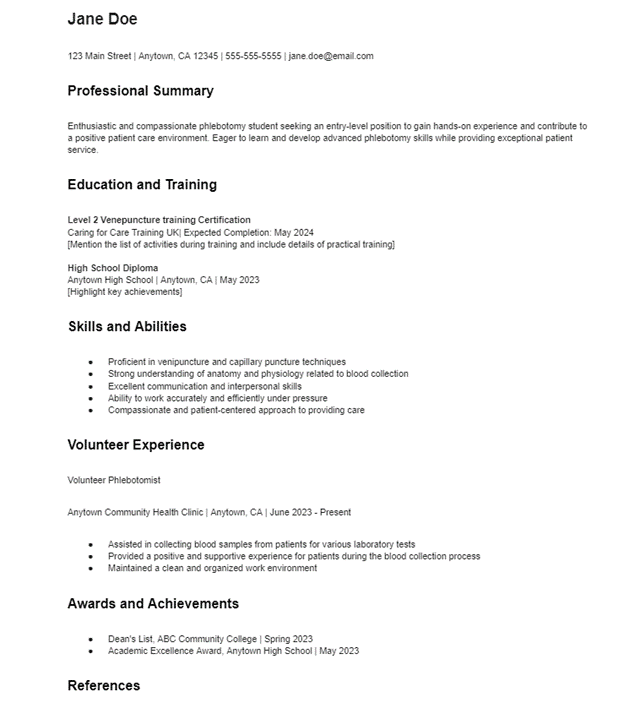
Preparing for your first Phlebotomy interview?
1. Find out about the company and the job:
Before your interview, take some time to learn about the company and the phlebotomist job you want. This shows you’re interested and helps you answer the interviewer’s questions better.
2. Know the basics of phlebotomy:
Before your interview, take some time to learn about the basics of phlebotomy. This includes understanding the different types of blood collection tubes, the proper order of draw, and how to handle difficult blood draws.
3. Practice answering common phlebotomy interview questions:
There are a number of common phlebotomist interview questions that you can expect to be asked, even if you don’t have any experience. Practice answering these questions aloud so that you can deliver your answers confidently and concisely. You can ask ChatGPT or any AI for likely interview questions.
You can put in this prompt: Can you please provide me with a list of common questions that an interviewer would likely ask during a phlebotomy job interview for someone who is just starting their career in this field?
Here is a list of questions from the prompt:
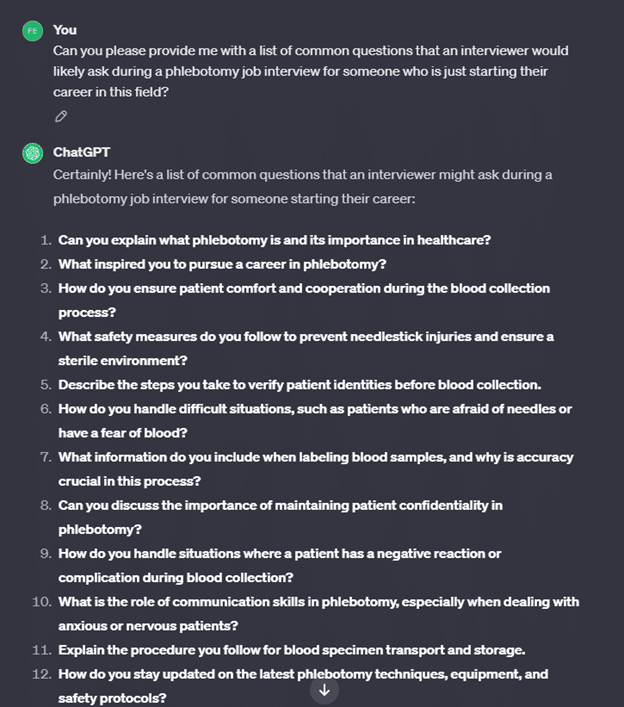
4. Highlight your transferable skills:
Even if you don’t have direct phlebotomy experience, you may have transferable skills that are relevant to the job. For example, if you have worked in customer service, you can highlight your communication and interpersonal skills.
5. Be prepared to talk about your passion for phlebotomy:
Even if you don’t have much experience, you can still show your passion for phlebotomy. Talk about what interests you about the field and what you hope to learn as a phlebotomist.
6. Dress professionally and arrive on time:
Make a good first impression by dressing professionally and arriving on time for your interview. This will show the interviewer that you are serious about the job and that you take your responsibilities seriously.
Additional tips for beginners with no experience:
If you have no experience as a phlebotomist, mention any volunteer or internship experience you have in the healthcare field.
This could be anything from shadowing a nurse to working in a hospital gift shop.
Be enthusiastic and positive. This will show the interviewer that you are excited about the opportunity to work as a phlebotomist.
Be prepared to ask questions about the job and the company. This will show the interviewer that you are interested in learning more about the position and the organisation.
Should You Become a phlebotomist?
If you want a flexible rewarding career behind the healthcare scenes, this niche is extremely employable, recession-proof and helps people daily through an overlooked yet impactful role anyone can learn.
Compared to some medical jobs, training is quick, but the difference made lasts lifelong!
So, in summary yes – if interested in healthcare fundamentals like biological processes, anatomy, disease pathways and frontline diagnostics.
Pursuing a career in phlebotomy gives you stable work where competence and compassion collecting blood samples sustains all modern therapeutic care.
Related Course: Cannulation Training For Nurses and Carers – Fully Practical training
What age can you become a phlebotomist in the UK?
In the UK, there isn’t a set minimum age for becoming a phlebotomist. But there are some basic rules:
- Employers usually like to hire phlebotomists who are at least 18 years old. This is because the job involves handling body fluids, needles, and talking to patients directly.
- To join a phlebotomy training program, you typically need to be at least 16 years old. Some colleges and training centers might have their own rules about how old you need to be.
- For safety reasons, employers usually don’t hire phlebotomists who are under 16-18 years old.
- Some employers might have extra age rules, like needing to be 21 or older to work with certain lab samples.
So even though there’s no strict law about how old you have to be, most people start training and working in phlebotomy at 18 or older in the UK.
The important thing is to finish an approved training course and get some practical experience, which is usually only open to people 16 and up.
From research about age to become Phlebotomist in the US as well, most states would prefer age 18+ to enrol in a vocational training.
Each states in the US regulates the health profession and would set the rules.
Frequently Asked Questions
Where can I study phlebotomy in the UK?
You can study phlebotomy at various training centres and institutions across the UK. At Caring for Care, we have a dedicated course on Phlebotomy and we train hundreds of nurses and other health professionals annually.
How long does it take to train as a phlebotomist?
The duration of phlebotomy training varies depending on course depth and training center. At Caring for Care, training for phlebotomy (Level 3 certification) takes 4-6 hours. This includes practical sessions using simulated arms.
What is the cost of a Level 3 Phlebotomy course?
phlebotomy training cost would vary depending on many factors such as the training provider, the level of certification, mode of learning, and the duration of the course. It’s essential to consider accredited programs that fit your budget and offer comprehensive training. However at Caring for Care, as at 2023, the cost is £170 which includes practical session for a level 3 Phlebotomy certification. You can check recent price for our phlebotomy course here.
What is the course for blood taking?
The course for blood taking typically covers techniques for drawing blood, proper handling of samples, and related skills. It provides essential training for those aspiring to become phlebotomists.
Let us Help you
We’ll help you find the right course for your needs. Tell us a little bit about your situation and what you would like to achieve.
We’ll get back to you within one working day.
